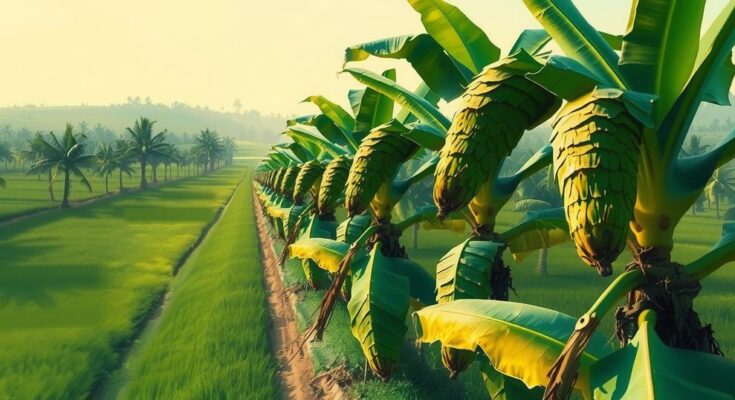A University of Exeter study warns that climate change could make banana cultivation in Latin America and the Caribbean unsustainable by 2080. The research indicates significant challenges ahead, with labor availability and infrastructure hindering adaptation efforts. Colombia and Costa Rica will be the most affected, while Ecuador and Brazil may fare better. Suggested solutions include improved irrigation and heat-tolerant banana breeds.
Recent research conducted by the University of Exeter indicates that climate change and increasing temperatures will render banana cultivation in Latin America and the Caribbean economically untenable by the year 2080. This study, titled “Socioeconomic Constraints to Climate Change Adaptation in a Tropical Export Crop,” published in Nature Food, reveals that within fifty years, 60% of the current banana-producing regions will face substantial challenges unless urgent actions are implemented to combat climate change.
The study highlights that labor availability and existing infrastructure are significant barriers to adaptation. Most banana farms are located near populous regions and ports, which limits the ability to relocate these plantations to more favorable areas for cultivation. Through the analysis of satellite imagery, researchers have observed that climate change is expected to decrease optimal agricultural zones, lower banana yields, and escalate workers’ exposure to extreme temperatures.
Colombia and Costa Rica are identified as among the countries likely to experience the most detrimental effects of these changes. Conversely, Ecuador and certain regions in Brazil are projected to encounter less severe consequences. The researchers advocate for various adaptation strategies, including enhancing irrigation infrastructure, developing heat and drought-resistant banana variety breeds, and assisting banana growers in managing climate-related risks effectively.
In summary, the research underscores the critical impact of climate change on banana production in Latin America and the Caribbean. With the potential for significant economic implications by 2080, it is imperative to adopt proactive adaptation strategies, including infrastructural improvements and the development of resilient banana varieties, to sustain this vital agricultural sector.
Original Source: www.freshfruitportal.com




